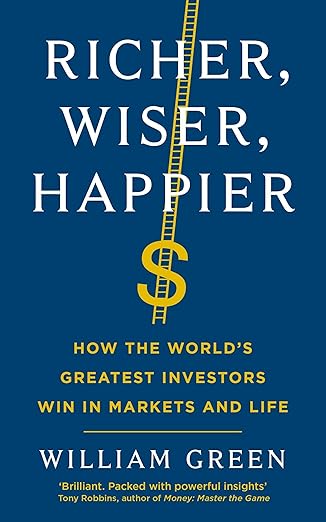Your cart is currently empty!
02.0005 Richer, Wiser, Happier

Richer, Wiser, Happier
2012 William Green
| Chapter | Smart Investing |
|---|---|
| Introduction: Inside the minds of the Greatest Investors | Bill Ruane: 1. Do not borrow money to buy stock. 2. Watch out for momentum – proceed with extreme caution. 3. Ignore market prediction. 4. Invest in a small number of stocks that you’ve researched so intensively that you have an informational advantage. |
| 1. The Man Who Cloned Warren Buffett | Mohnish Pabrai: By cloning Buffett – and later, his polymathic partners, Charlie Munger. On 3 core concept. 1. Whenever you are buy a stock, you’re purchasing a portion of an ongoing business with an underlying value, not just a piece of paper for speculators to trade. 2. Stock prices frequently fail to reflect the true value of these businesses. 3. You should buy a stock only when it’s selling for much less than your conservative estimate of its worth. |
| Lesson from Monish: Rule 1: Clone like crazy. Rule 2: Hang out with people who are better than you. Rule 3. Treat life as a game, not as a survival contest or a battle to the death. Rule 4: Be in alignment with who you are; don’t do what you don’t want to do or what’s not right for you. Rule 5: Live by an inner scorecard; don’t worry about what others think of you; don’t be defined by external validation Munger’s :”Take a simple idea and take it seriously.” | |
| 2. The Willingness to Be Lonely | Sir John Templeton: “You have to buy at time when other people are desperately trying to sell.” |
| 6 Guiding Principles for the Nontribal Investors: 1. Beware of emotion. 2. Beware of your own ignorance. 3. You should diversify broadly to protect yourself from your own fallibility 4. Successful investing requires patience. 5. The best way to find bargains is to study whichever assets have performed most dismally in the past 5 years, then to assess whether the cause of those woes is temporary or permanent. 6. As an investor is not to chase fads (crowd madness). | |
| 3. Everything Changes | – |
| 4. The Resilient Investor | Jean-Marie Eveillard: His new investment strategy was built on one all-important insight that he drew from The Intelligent Investor. “Because the future is uncertain, you want to minimize your risk.” says Eveillard. |
| 5 Rules for Resilience 1. We need to respect uncertainty. 2. It’s important to reduce or eliminate debt, avoid leverage, and beware of excessive expenses, all of which can make us dependent on the kindness of stranger. 3. Instead of fixating on short-term gains or beating benchmarks, we should place greater emphasis on becoming shock resistant, avoiding ruin, and staying in the game. 4. Beware of overconfidence and complacency. 5. We should be keenly aware of our exposure t risk and should always require a margin of safety. | |
| 5. Simplicity Is the Ultimate Sophistication | Will Danoff’s Secret Sauce: Stocks follow earnings. |
| Greenblatt: If you bought a stock for much less than its intrinsic value, other investors would figure it out sooner or later and drive up the price. I didn’t see how I was going to lose much money. “I don’t buy more of the ones I can make the most money on. I buy more of the ones that I can’t lose money on. Cheap + Good = The Holy Grail Buying cheap is great – and if I can buy good businesses cheap, even better. Buy Good businesses at a bargain price. It’s not enough to find a smart strategy that stacks the odds in your favor over the long haul. You also need the discipline and tenacity to apply that strategy consistently, especially when it’s most uncomfortable. Principles underpinning his strategy: 1. Stocks are ownership shares of businesses, which must be valued. 2. They should be bought only when they trade for less than they are worth. 3. In the long run, the market is rational and will (more or less) reflect the fair value of these businesses. | |
| 4 Simple Lessons: 1. You don’t need the optimal strategy. You need a sensible strategy that’s good enough to achieve your financial goals. 2. Your strategy should be so simple and logical that you understand it, believe in it to your core, and can stick with it even in the difficult time when it no longer seems to work. 3. You need to ask yourself whether you truly have the skills and temperament to beat the market. 4. It’s important to remember that you can be a rick and successful investor without attempting to beat the market. | |
| 6. Nick & Zak’s Excellent Adventure | Nick Sleep & Qais “Zak” Zakaria (Nomad Investment Partnership, Nomad means far more to us than simply managing a fund). Crazy bargain in Singapore, Hong Kong and the Philippines. Most brokers focused on popular assets that were easy to sell. |
| 5 Key lessons to be learned from Sleep and Zakaria: 1. To pursue quality as a guiding principle in business, investing, and life – moral and intellectual commitment inspired by Zen and the Art of Motocycle Maintenance. 2. The ideal of focusing on whatever has the longest shelf life, which always downplaying the ephemeral. 3. There is the realization that one particular business model – scale economies shared – creates a virtuous cycle that can generate sustainable wealth over long periods. 4. It’s not necessary to behave unethically or unscrupulously to achieve spectacular success, even in a voraciously capitalistic business where self-serving behavior is the norm. 5. In the world that’s increasingly geared toward short-termism and instant gratification, a tremendous advantage can be gained by those who move consistently in the opposite direction. | |
| 7. High Performance Habits | Tom Gayner: Resounding victories tend to be the result of small, incremental advances and improvements sustained over long stretches of time. Make you mistake non-fatal. It’s so fundamental to longevity, and ultimately, that’s what success is in the business: Longevity. You don’t need to be extreme to achieve exceptional long-term results. On the contrary, he says, “People get themselves into trouble with extremes.” You cannot control the outcome. You can only control the effort and the dedication and the giving of 100% of yourself to the task at hand. And then whatever happens, happens. |
| 8. Don’t Be a Fool | “The Grand Master of Stupidity Reduction”: He (Charlie Munger) focusses so much attention on avoiding common errors and predictable pattern of irrationality – Principle of Inversion. |
| “What We Don’t Do”: Carlie and I (Warren Buffett) avoid businesses whose futures we can’t evaluate, no matter how exciting their products may be, sticking instead with businesses whose profit picture for decades to come seems reasonably predictable. | |
| Munger: The more transparently he reviews his mistakes, the less likely he is to repeat them (not buying Google, blew Walmart when is was a total cinch) | |
| “Defensive Principles and Practices” (Tillinghast): Don’t pay too much. Don’t go for businesses that are prone to obsolescence and destruction. Don’t invest with crooks and idiots. Don’t invest in things you don’t understand. A Portfolio packed with undervalued, understandable, financially stable, profitable and growing businesses run by honest people. | |
| “Discipline Growth Investors” (Fred Martin): Mid-cap stocks min. 12% per year, small caps min. 15% per year, a standardized requirements force him systematically to buy stocks only when they are a sufficiently attractive proposition. He never invest more than 3% of his assets in a stock at the time of purchase. Typically, he owns 45 to 50 stocks. | |
| Beware of Your Brain: Psychological tendencies – standard thinking errors, misjudgment. | |
| Epilogue | Dilgo Khyentse rinpoche, a Tibetan Buddhist master who was a teacher of the Dalai Lama, once said, “Those who seek happiness in pleasure, wealth, glory, power, and heroics are as naive as the child who tries to catch a rainbow and wear it as a coat” |

Leave a Reply